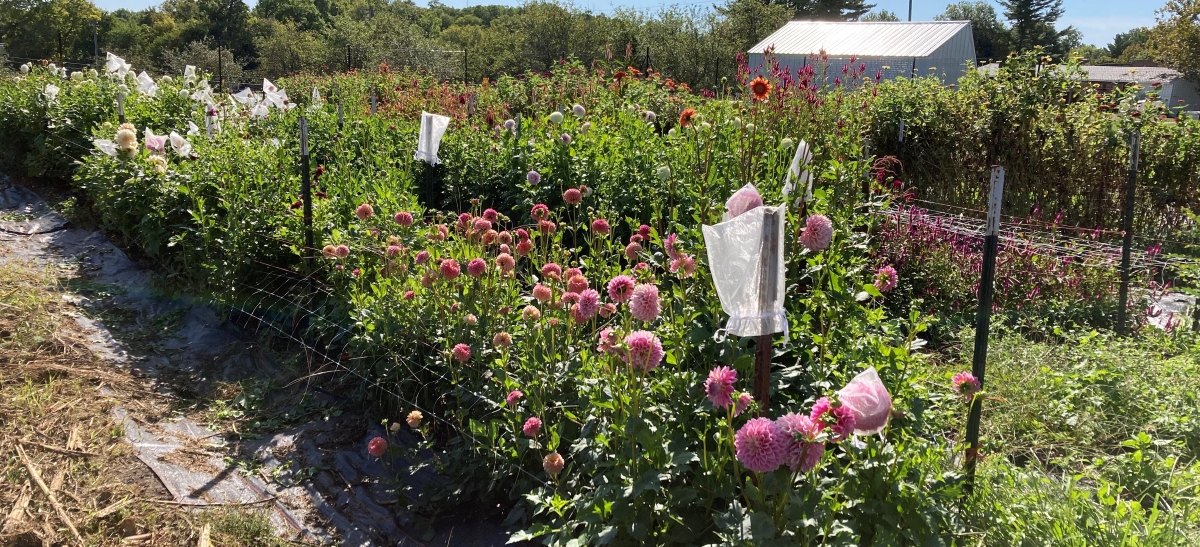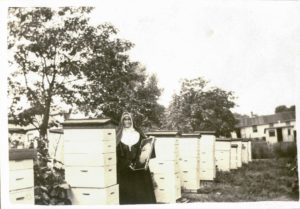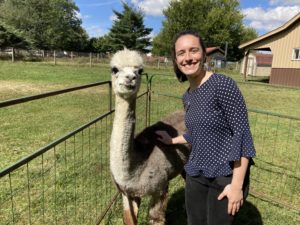Exploring Eco-Justice in Action at the White Violet Center Farm
- by Elise Kulers

The farm’s certified organic beds boast stunning flowers like these dahlias
On a sunny fall afternoon outside of Terre Haute, Indiana, Midwest Fellow Elise Kulers joined 20 first-year and transfer students of Saint Mary-of-the-Woods college on a tour of the White Violet Center for Eco-Justice farm.
Elise and the students met with Farm Projects Coordinator Tara Elmore, who showed them around the farm and pasture, which boasts over 90 acres of pollinator habitat and 300 acres of surrounding forest. Tara explained the history of the White Violet Center, which was founded by the Sisters of Providence, an apostolic congregation of Catholic women. The Sisters of Providence were established in St. Mary-of-the-Woods in 1840 by Saint Mother Theodore Guerin, who simultaneously started what would become Saint Mary-of-the-Woods College after moving to the area from France. From the beginning, the Sisters lived off the land, keeping bees and growing food as well as herbs for medicinal use.

Sister Ann Joseph Morris, known as the “keeper of the bees” poses next to the Saint Mary-of-the-Woods apiary, photo dated 1900.
While a separate entity from the college, the Sisters of Providence still share close ties. The White Violet Center farm, which was officially founded in 1995, is one of the fulcrums of this close connection. The farm possesses an apiary, a stand of fruit trees, flock of 150 laying hens, herd of alpacas, and five Certified Organic acres of farmland, which are devoted to year-round vegetable production. Tara and the team sell this produce to the Bon Appétit team at Saint Mary-of-the-Woods, providing hyperlocal vegetables to the Doherty Dining Hall. They also sell food in the White Violet Center’s own farm store and donate to local hunger-fighting organizations in Terre Haute.
As Elise and the group ambled around the sprawling property, Tara noted that much of the White Violet Center’s work involves continually rebuilding the land. The Sisters do this through a combination of composting food scraps, which are provided by the Bon Appétit team, and by utilizing the nutrient-dense droppings from their alpaca herd and chickens. In addition to fertilizing the soil and providing healthy land management through rotational grazing, the 40 alpacas at the farm serve as a source of fun for students and visitors alike while also providing fiber, which is knit into clothing and hats.
But beyond simply growing food, the White Violet Center farm is where the spiritual, ethical, and environmental commitments of the Sisters of Providence are put into practice. The Sisters are guided by a land ethic that commits them to key tenets of eco-justice, including “conserving natural resources and preserving species, promoting conservation, restoring land through food production, and the management of forests and wild spaces,” among other considerations.

Midwest Fellow Elise Kulers poses with an alpaca named Georgie at the White Violet Center farm
As Tara explained, it’s this commitment and intentionality towards eco-justice that distinguishes their farming operation and truly informs everything they do. Through their ministry, they serve as advocates for the earth and the communities that depend on it, showing up for climate action, racial justice, and neighbors in need. The mere existence of the farm also carries a greater purpose: to instill in its visitors a sense of consciousness towards the environment, with the hopes of inspiring a connectedness with the earth, and to each other.